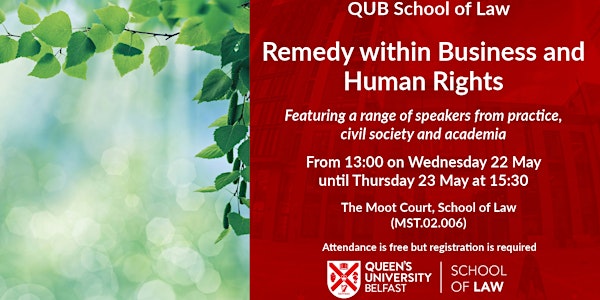
Remedy within Business and Human Rights
The Research, Practice, and Lived Experience of Remedy within Business and Human Rights From Local to Global
Date and time
Location
Queen's University Belfast - School of Law
Moot Court Main Site Tower Belfast BT7 1PD United KingdomAbout this event
- 4 hours
The Research, Practice, and Lived Experience of Remedy within Business and Human Rights From Local to Global
Fundamental to the business and human rights movement is the idea that where there has been a human rights impact, the victim must have access to an effective remedy (UNGPs). The fourth draft of a proposed binding instrument on Business and Human Rights published in July 2023 considers remedy as: the restoration of a victim of a human rights abuse to the position they would have been had the abuse not occurred, or as nearly as is possible in the circumstances. An “effective remedy” involves reparations that are adequate, effective, and prompt; are gender and age responsive; and may draw from a range of forms of remedy such as restitution, compensation, rehabilitation, satisfaction, such as cessation of abuse, apologies, and sanctions), as well as and guarantees of non-repetition. Human rights abuses cut across all industries, all forms of business (formal, informal, legal and illegal), all nations and all cultures. How, where and when these are remedied in a way that is deemed effective to the victim(s) of that human rights abuse is, in our view, pivotal to the effectiveness or otherwise of the business and human rights movement. Policy papers, government funding into research on and commitments to remedy are not enough if they are not accompanied with improvements to the lived experiences of those vulnerable to human rights abuses from corporate operations. We believe in an ‘holistic’ (Macchi, 2022) approach to business and human rights, one which recognises the context of the victim, the event, the locale, and the response. With that in mind, we are hosting this conference that considers remedy within business and human rights from the perspective of academics, practitioners, and civil society.
We are keen to see how remedy is understood, interpreted and applied across the difference sectors and within difference contexts and how any convergences/divergences can improve those most in need of access an effective remedy in our communities.
Our objectives are: 1. To investigate the various approaches to remedy and the remedial process from the prospective of academia, practice, civil society and victims; 2. To gain insight into the extent and promise of remedy; 3. To consider context and how this might contribute to the particular experiences of and around remedy at a particular time; 4. To better understand how a holistic approach to remedy might be achieved at local levels and how to promote better engagement between relevant parties, and routes to remedy.
Speakers include:
Alyson Kilpatrick, Human Rights Chief Commissioner (NIHRC),
Kirsten McKevitt, Human Trafficking and Modern Slavery Specialist Prosecutor (PPS),
Jeannie McCann – (Strategic Investment Board),
Eamonn McNally, Solicitor, (Children’s Law Centre),
Fiona McGaughey (University of Western Australia),
Ben Grama (Tilburg University),
Ciaran O’Kelly, Bróna McNeill, Marisa McVey, Joan Loughrey, and Ciara Hackett, (QUB LAW), Ekaterina Aristova (Oxford University),
Lucas Roorda (University of Utrecht),
Julianne Hughes Jennet (Quinn Emanuel),
Nora Wolters University of Hamburg,
Dearbhla Minogue (GLAN) &
Jessica Ní Mhainín (UK Anti-SLAPP Coalition)
This event attracts 6 CPD points.
Please note that this is a two day event beginning from lunchtime Wednesday 22 May until Thursday 23 May at 15:30.